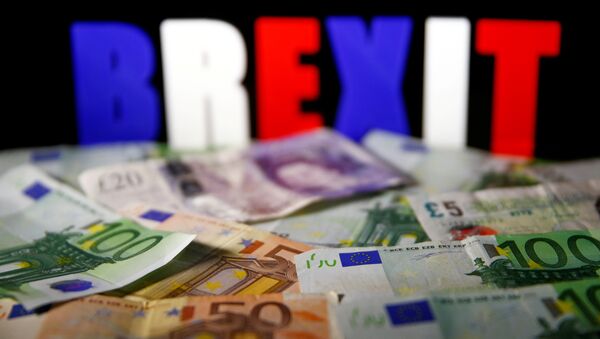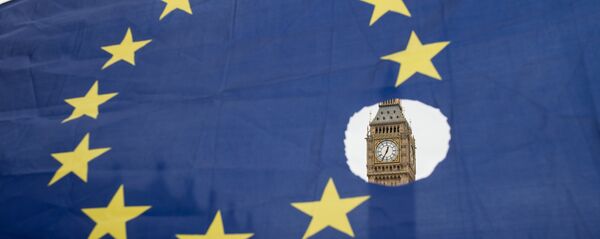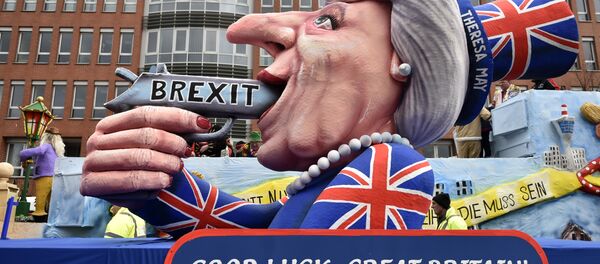Kristian Rouz – The EU is set to launch a probe into the UK’s corporate tax rule, which allows multinational enterprises to pay lower taxes in Britain as compared to the rest of Europe. Authorities in Brussels believe the 2013 rule enforced by then-Chancellor of the Exchequer George Osborne provides the UK with an unfair competitive edge, and lowers the investment appeal of the EU.
This comes as the Brexit talks are approaching the ‘no deal’ point, and a ‘hard Brexit’ is becoming an increasingly likely outcome.
READ MORE: EU to Probe UK Scheme Allowing for Tax Exemption for Multinational Corporations
EU Competition Commissioner Margrethe Vestager says the UK corporate tax scheme allows multinationals to avoid the bloc’s anti-tax-evasion law. The EU believes Britain also allows multinationals to pay lower taxes than domestic-only companies.
Since going into effect two years later, the scheme has improved the UK’s corporate sector revenues, and whilst the Treasury might have lost money in unpaid taxes, the growth of its tax base and a boost in employment have somewhat made up for the direct losses in fiscal revenue.
READ MORE: UK Economic Health in Doubt as Bank of England Nears Rate Hike
Last year, multinationals underpaid some £5.8 bln in UK corporate taxes, up 50 percent from 2015, according to the data from Her Majesty’s Revenue and Customs (HMRC). The HMRC said some multinationals have abused the loopholes granted under the Osborne rule, through money transfers between separate companies belonging to the same multinational enterprise.
Yet, also in 2016, foreign banks alone did pay £17.3 bln in UK taxes, a 3.5-percent increase from the previous year, whilst the total tax revenue collected from multinationals in the UK was almost £35 bln.
The UK tax gap estimates for 2015-16 have been published this morning and show that unpaid tax is at a record lowhttps://t.co/90KD8DzfHO pic.twitter.com/O5LygGNyPB
— HM Revenue & Customs (@HMRCgovuk) 26 октября 2017 г.
“The tax affairs of the UK’s largest businesses are a top priority for HM Revenue & Customs, particularly the use of cross-border structures including the possible manipulation of pricing methods,” Ian Hyde of international law firm Pinsent Masons said. “HMRC has been investing in transfer pricing specialists and this is clearly reflected in the figures.”
Despite HMRC’s concern, the UK’s loose fiscal policies are poised to continue, albeit the cabinet of Prime Minister Theresa May might protract on across-the-board tax cuts.
This is stirring no small outrage within certain circles within the EU, as Brussels feels the UK might become even more attractive to multinationals in the post-Brexit period. Besides, a ‘hard Brexit’ scenario would significantly impair ties, including trade relations, between the UK and the EU, meaning the continent will lose the benefits of the UK-based multinationals’ cross-border pricing manipulations.
The UK, however, rebuffed the EU’s claims, saying Britain has exercised ‘controlled foreign company’ rules for over three decades, and had never had a problem with the bloc regarding the matter – not least due to generous money transfers from London to Brussels, which will soon stop.
“We do not believe these rules are incompatible with EU law but will cooperate with the European commission’s investigation,” a UK Treasury representative said. “We are clear that all multinationals must pay tax on any profits they make in the UK, and our rules prevent these profits from being artificially diverted overseas.”
.@HMRCgovuk stats out today show unpaid tax is at a record low meaning more money for our vital public services. https://t.co/FFSwPFKNyG pic.twitter.com/OP83P1IcZ2
— Mel Stride MP (@MelJStride) October 26, 2017
The EU has repeatedly voiced concern the UK could follow the ‘hard Brexit’ scenario, subsequently turning itself into a tax haven, thus draining investment capital from the continent. Brussels says it will battle the ‘illegal’ tax breaks, and is currently looking at a number of EU member-states, whose tax policies might be ‘incompatible’ with the EU rules.
These countries allegedly also include Ireland, Belgium, Luxembourg, and the Netherlands.



